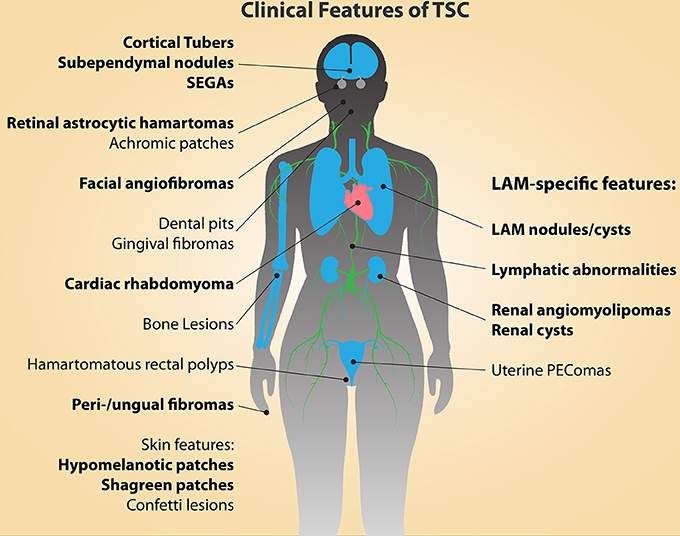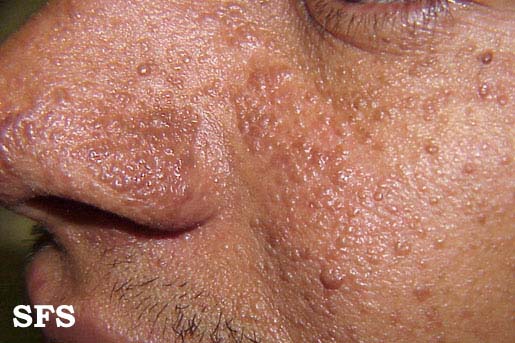Tuberous Sclerosis Complex (TSC) is a rare genetic disorder that affects multiple systems in the body. It causes non-cancerous tumors to grow in various organs, including the brain, skin, kidneys, heart, eyes, and lungs. This condition can lead to a wide range of symptoms and complications, making it essential for individuals and caregivers to understand its nature, progression, and management. In this article, we will explore the symptoms, diagnostic methods, and treatment options available for those affected by Tuberous Sclerosis.

Understanding Tuberous Sclerosis
Tuberous Sclerosis is caused by mutations in one of two genes: TSC1 or TSC2. These genes are responsible for regulating cell growth and division. When they malfunction, abnormal cell proliferation occurs, leading to the formation of benign tumors. The severity of the condition varies widely among individuals, with some experiencing mild symptoms while others face life-threatening complications.
How Does Tuberous Sclerosis Develop?
The mutations in the TSC1 or TSC2 genes disrupt the normal functioning of proteins that control cell growth. As a result, cells divide uncontrollably, forming tumors in different parts of the body. These tumors are usually benign but can cause significant health problems depending on their size, location, and number.
Symptoms of Tuberous Sclerosis
The symptoms of Tuberous Sclerosis can manifest at any age, from infancy to adulthood. They vary greatly depending on which organs are affected. Below is a detailed breakdown of the most common symptoms associated with this condition.
Skin Manifestations
- Hypopigmented Spots: Light-colored patches on the skin, often present at birth or appearing in early childhood.
- Facial Angiofibromas: Small, reddish bumps that typically appear on the face, particularly around the nose and cheeks.
- Shagreen Patches: Raised, thickened areas of skin with an orange-peel texture, commonly found on the lower back.
- Ungual Fibromas: Small growths that develop under or around the nails.
Neurological Symptoms
- Seizures: One of the earliest and most common symptoms, often beginning in infancy or early childhood.
- Developmental Delays: Children may experience delays in reaching milestones such as walking or talking.
- Intellectual Disability: Some individuals may have mild to severe cognitive impairments.
- Behavioral Issues: Conditions like autism spectrum disorder, attention deficit hyperactivity disorder, and anxiety are more prevalent in people with Tuberous Sclerosis.
Kidney Problems
- Renal Angiomyolipomas: Benign tumors in the kidneys that can cause pain, bleeding, or kidney failure if they grow too large.
- Cysts: Fluid-filled sacs that may develop in the kidneys, potentially impairing their function over time.
Heart Complications
- Rhabdomyomas: Non-cancerous tumors that form in the heart muscle. These are often detected during prenatal ultrasounds and tend to shrink as the child grows older.
Lung Involvement
- Lymphangioleiomyomatosis: A condition primarily affecting women, characterized by the growth of abnormal muscle cells in the lungs, leading to breathing difficulties.
Eye Abnormalities
- Retinal Hamartomas: Non-cancerous growths on the retina that may affect vision if they grow near critical structures.
Diagnosing Tuberous Sclerosis
Diagnosing Tuberous Sclerosis involves a combination of clinical evaluations, imaging studies, and genetic testing. Early diagnosis is crucial for managing symptoms effectively and preventing complications.
Clinical Evaluation
A healthcare provider will conduct a thorough physical examination to identify characteristic signs of the condition, such as skin lesions, seizures, or developmental delays. A detailed medical history is also essential to determine whether family members have been diagnosed with similar symptoms.
Imaging Studies
- Magnetic Resonance Imaging (MRI): Used to detect tumors in the brain and other soft tissues.
- Computed Tomography (CT) Scans: Helpful in identifying tumors in the kidneys, lungs, and other organs.
- Ultrasound: Often used during pregnancy to detect cardiac rhabdomyomas or after birth to monitor kidney health.
Genetic Testing
Genetic testing plays a vital role in confirming the diagnosis of Tuberous Sclerosis. By analyzing DNA samples, doctors can identify mutations in the TSC1 or TSC2 genes. This information not only helps confirm the diagnosis but also provides valuable insights into the potential risks for future generations.
Treatment Options for Tuberous Sclerosis
While there is no cure for Tuberous Sclerosis, several treatment strategies aim to manage symptoms and improve quality of life. Treatment plans are highly individualized, depending on the specific needs of each patient.
Medications
- Antiepileptic Drugs: Used to control seizures, which are a hallmark symptom of the condition.
- mTOR Inhibitors: Medications like everolimus target the underlying molecular pathway involved in tumor growth, reducing the size of certain types of tumors.
Surgical Interventions
- Tumor Removal: Surgery may be necessary to remove large or symptomatic tumors, especially those affecting vital organs like the brain or kidneys.
- Laser Therapy: Used to reduce the appearance of facial angiofibromas and other skin lesions.
Supportive Therapies
- Physical Therapy: Helps improve motor skills and mobility in children with developmental delays.
- Occupational Therapy: Focuses on enhancing daily living skills and independence.
- Speech Therapy: Assists individuals with communication challenges.
Monitoring and Regular Check-Ups
Regular follow-up appointments with specialists are critical for monitoring disease progression and adjusting treatment plans accordingly. For example, individuals with kidney involvement require frequent imaging to track the growth of renal angiomyolipomas.
Lifestyle Modifications
- Dietary Changes: A balanced diet rich in fruits, vegetables, and whole grains supports overall health and well-being.
- Exercise: Regular physical activity promotes cardiovascular health and reduces stress.
- Stress Management: Techniques such as mindfulness meditation and yoga can help manage anxiety and improve mental health.
Living with Tuberous Sclerosis
Living with Tuberous Sclerosis presents unique challenges, but many individuals lead fulfilling lives with proper care and support. Building a strong network of healthcare providers, family, and friends is key to navigating the complexities of this condition. Additionally, connecting with advocacy groups and support communities can provide valuable resources and emotional support.
Educational Support
Children with Tuberous Sclerosis often benefit from specialized educational programs tailored to their needs. Individualized Education Plans (IEPs) can ensure they receive appropriate accommodations and interventions to thrive academically.
Financial Assistance
Families affected by Tuberous Sclerosis may face financial burdens due to medical expenses. Various organizations offer grants, scholarships, and assistance programs to help alleviate these costs.
Advancements in Research
Ongoing research continues to shed light on the mechanisms underlying Tuberous Sclerosis, paving the way for new therapies and improved outcomes. Participation in clinical trials may provide access to cutting-edge treatments and contribute to scientific advancements.





